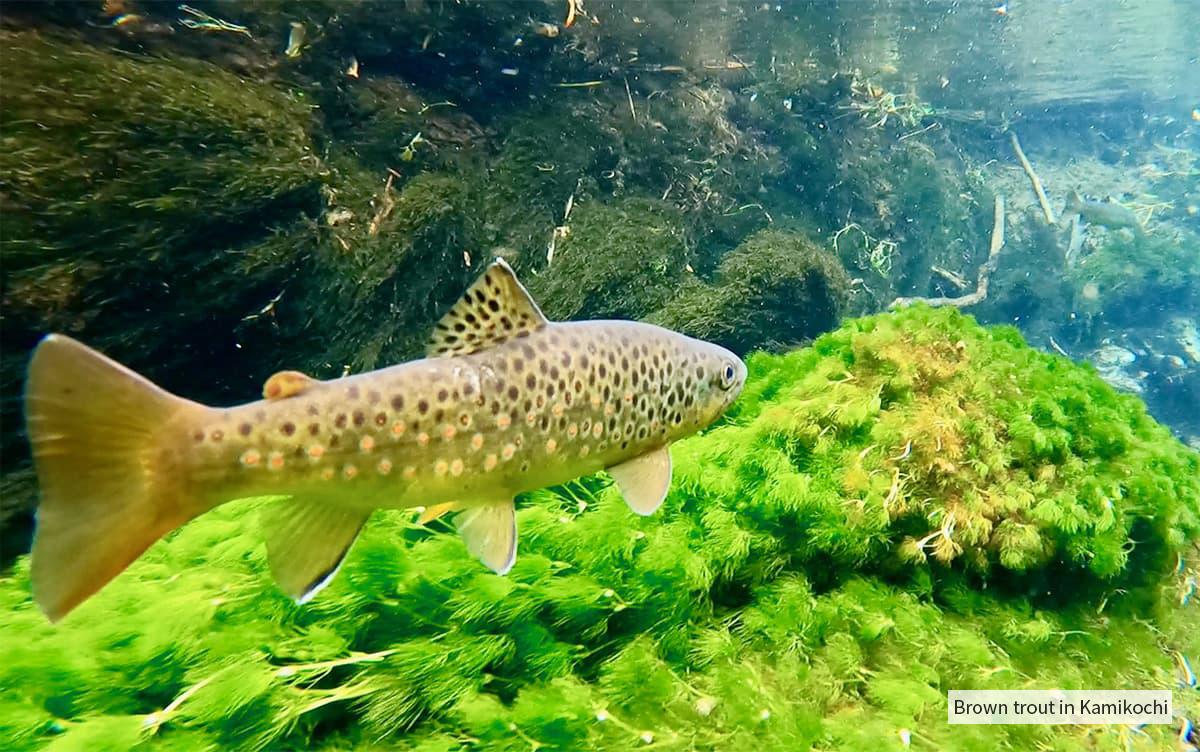Research News
Effects of Invasive Trout on Native Charr in Kamikochi, Nagano

The competitive relationship between invasive trout species, brown trout and brook trout, and native white-spotted charr were investigated in Kamikochi, Nagano Prefecture, Japan. The research team revealed that brook trout share a strikingly similar diet and ecological niche with white-spotted charr. Furthermore, brown trout was identified as a direct predator of the white-spotted charr. These combined effects are considered contributing factors to the observed decline in the population of the white-spotted charr.
Tsukuba, Japan—Globally, salmonids have been widely introduced into freshwater areas for aquaculture and recreational angling. brown trout (Salmo trutta), which are native to Europe, and brook trout (Salvelinus fontinalis), which are native to North America, were introduced to Japan, and currently there are concerns that they are having a negative impact on the distribution and habitat of native white-spotted charr (Salvelinus leucomaenis) in Japan. In particular, many tributaries that flow into the Azusa River in Kamikochi, Nagano Prefecture are dominated by these invasive trout stocked in the Taisho and early Showa eras. Subsequently, native white-spotted charr populations in these areas have declined over the past 50 years.
In this study, researchers conducted underwater observations and diet analyses in headwater tributaries of the Azusa River, where invasive trout (brown trout and brook trout) coexist with native white-spotted charr. The objective was to elucidate the competitive dynamics among the three species. During the underwater observations conducted from June to September 2021, the foraging attempts per minute among all species were similar. However, brook trout and white-spotted charr engaged in benthic and water column foraging, while brown trout primarily foraged in the water column. Furthermore, dietary preferences varied; white-spotted charr and brook trout primarily consumed aquatic invertebrates, whereas brown trout predominantly fed on terrestrial organisms, including terrestrial insects, amphibians and fish.
These results indicate a substantial overlap in prey resource use between brook trout and native white-spotted charr. Additionally, beyond directly preying on native white-spotted charr, brown trout may influence the entire mountain stream ecosystem through predation on terrestrial organisms.
###
Miles I. Peterson is supported by the Grant-in-Aid for JSPS Fellows (DC: 20J20656, PD: 23KJ0233) and Yoshiaki Tsuda is supported by the Wildlife management research project grant by the Mountain Science Center, University of Tsukuba.
Original Paper
- Title of original paper:
- Species-specific foraging behavior and diets of stream salmonids: An implication for negative impacts on native charr by nonnative trout in Japanese mountain streams
- Journal:
- Ecological Research
- DOI:
- 10.1111/1440-1703.12419
Correspondence
JSPS Research Fellow (PD) Miles I Peterson
Sugadaira Research Station, Mountain science center Sugadaira research station, University of Tsukuba
Senior Researcher KITANO Satoshi
Nagano Environmental Conservation Research Institute
Chief Researcher YAMAMOTO Shoichiro
Nikko Field Station, Fisheries Technology Institute, Japan Fisheries Research and Education Agency
Related Link
Sugadaira Research Station, Mountain science center Sugadaira research station, University of Tsukuba
Institute of Life and Environmental Sciences









